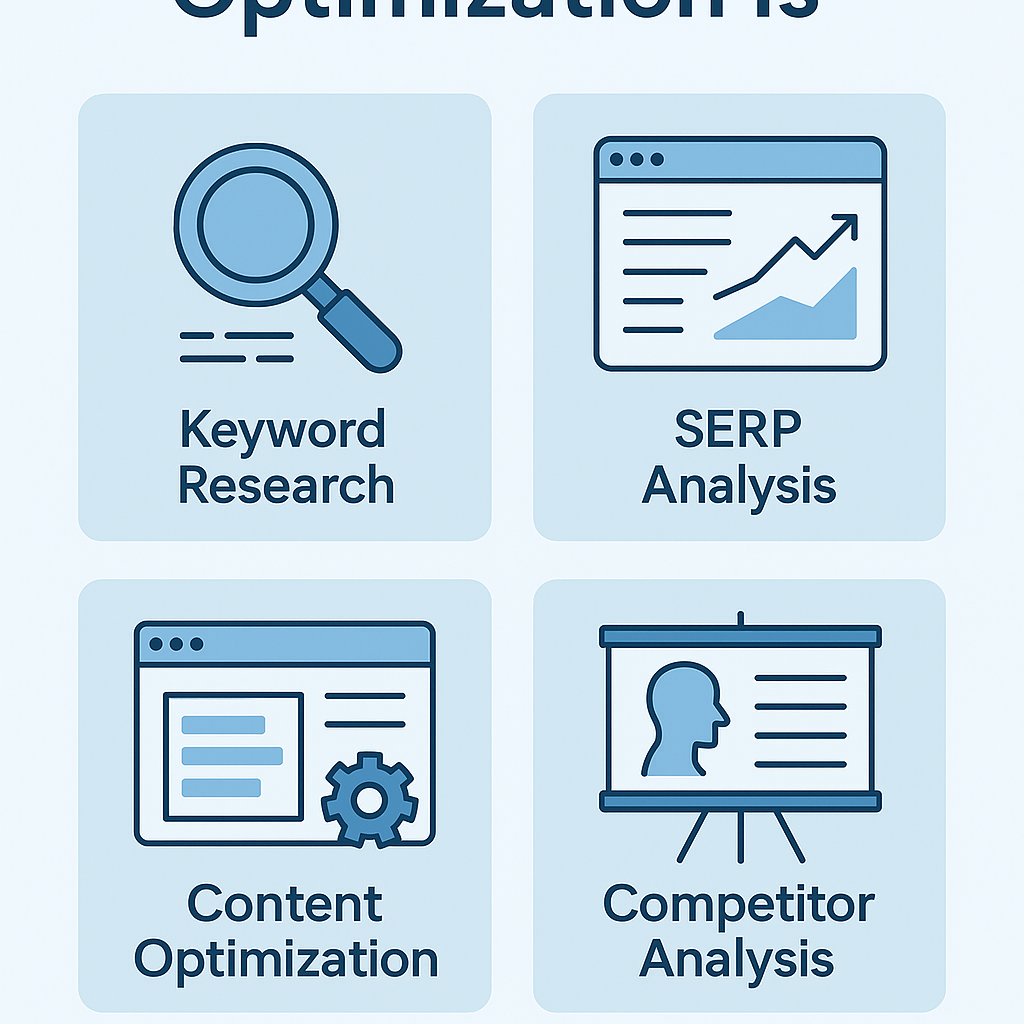Artificial intelligence (AI) is transforming search in dramatic ways. Search engines are increasingly blending machine learning and natural language processing (NLP) into ranking systems — and the rise of generative AI interfaces (ChatGPT, Google Gemini, Perplexity, Claude, Bing Copilot) is shifting search behavior from traditional list-based results to conversational, answer-driven experiences.
This transformation is forcing brands, agencies, publishers, and SEO professionals to rethink how they optimize for visibility. To stay competitive in this new era, businesses are turning to AI search optimization tools — platforms that leverage automation, predictive analytics, and AI-assisted workflows to improve rankings across both traditional search engines and emerging AI search platforms.
But with dozens of tools on the market, each offering unique features, it can be overwhelming to choose the right one.
This guide will walk you through how to compare AI search optimization tools, what features matter most, and which questions to ask before selecting a platform. Whether you’re a marketer, business owner, or SEO professional, you’ll learn how to evaluate tools based on accuracy, capabilities, workflows, scalability, performance insights, and cost.

1) What Are AI Search Optimization Tools?
AI search optimization tools use artificial intelligence to streamline or augment SEO tasks such as:
- Keyword research
- SERP analysis
- Content optimization
- Topic clustering
- Ranking predictions
- Competitor analysis
- Content writing
- Link recommendations
- Content refreshes
- Analytics and tracking
They differ from traditional SEO tools in two major ways:
✅ 1. Generative + Predictive Capability
AI tools can analyze search intent, predict topic gaps, and even produce draft content with targeted optimization.
✅ 2. Automation at Scale
AI tools automate or accelerate time-consuming SEO tasks — from technical audits to metadata generation and content briefs.
Because search is evolving beyond traditional SERPs, these tools increasingly include features to help optimize for Google AI Overviews, ChatGPT responses, Perplexity answers, and other AI-driven environments.
2) Why AI Search Optimization Matters
Search systems prioritize relevancy, authority, and user intent — but in 2025, AI-driven search experiences demand content that is:
- Highly structured
- Clear and factual
- Built for multi-modal indexing (text, video, code, data)
- Contextually authoritative
AI tools help teams:
✅ Identify topics with high AI-Ranking potential
✅ Improve content structure for machine understanding
✅ Speed content production
✅ Improve match between content + user intent
✅ Monitor performance across emerging platforms
Because AI search systems pull information not only from traditional SERPs but also knowledge graphs, structured data, and high-authority pages, optimizing content with AI tools is increasingly a competitive necessity.
3) Key Factors to Consider When Comparing AI Search Optimization Tools
Choosing the right platform requires understanding your workflow, budget, and goals.
Below are the 11 most important comparison factors.
✅ 1) Core Features
Does the tool support your most important tasks?
Look for:
- Keyword research
- Content scoring
- AI content analysis
- SERP intelligence
- Topic clustering
- Content brief generation
- On-page optimization
- AI SERP opportunity detection
- Competitor insights
- Content refresh recommendations
Example:
Some tools specialize in content creation, while others focus solely on analytics.
The best tools provide both creation + optimization capabilities.
✅ 2) Data Sources & Accuracy
Where does the tool get its data?
Reliable tools pull from:
- Search engine APIs
- Live SERP scraping
- AI system data
- First-party traffic analytics
- Industry benchmarks
Key criteria:
- Accuracy
- Database size
- Frequency of updates
- Transparency of data sources
If data is outdated or unclear, your insights may be unreliable.
✅ 3) AI Content Generation Quality
Most AI tools assist with content creation. When comparing platforms, review:
- Quality of AI writing
- Tone adaptability
- Language support
- Fact accuracy
- Citation handling
- Plagiarism detection
- Prompt flexibility
Better AI systems provide structured, SERP-aware content — not generic text.
✅ 4) Content Optimization Features
Top-tier AI SEO tools don’t just write content — they optimize it.
Essential features:
- Content scoring (topic coverage + keyword presence)
- SERP competitor analysis
- NLP topic extraction
- Readability analysis
- Suggested headers
- On-page optimization recommendations
- Red flag detection (thin content, missing topics, weak intro)
Tools should help align content with AI + search requirements.
✅ 5) Search Intent Recognition
Does the tool understand:
- Transactional
- Navigational
- Informational
- Commercial investigation intent?
Tools must analyze intent to recommend correct content type + message.
✅ 6) SERP + AI Answer Engine Compatibility
Does it support optimization for:
- Bing
- Perplexity
- ChatGPT
- Gemini
Top platforms analyze how content is used in AI answers, not just blue links.
✅ 7) Competitive Analysis
Features to compare:
- Competitor keyword insights
- Topic gap analysis
- Domain strength analysis
- Link profile benchmarking
- SERP trend comparison
Tools should highlight how your competitors rank in both traditional + AI search.
✅ 8) Integrations & Workflow Support
Examples:
- Google Search Console
- Google Analytics
- WordPress
- CMS integration
- Scheduling systems
- API support
Better integrations → faster content production → better ROI.
✅ 9) Scalability & Collaboration
Teams need:
- Multi-seat support
- Shared workspaces
- Document versioning
- Approval pipelines
- Cross-team task assignment
Enterprise teams require high scalability.
✅ 10) Support, Learning, & Onboarding
Top considerations:
- Tutorials
- Support responses
- Onboarding assistance
- Training
- Documentation
Good support reduces time to value.
✅ 11) Pricing + ROI
AI SEO tools range from $20/month to $600/month+.
When comparing, evaluate:
- Feature-to-price ratio
- Seat count
- Usage limits
- Data access limitations
- Model usage fees
The best pricing model depends on:
- Team size
- Content volume
- Growth goals
4) Step-by-Step Process for Comparing AI Search Optimization Tools
Here is a systematic method to evaluate and choose the right tool.
✅ Step 1 — Define Your SEO Goals
Examples:
- Increase organic traffic
- Rank new pages faster
- Expand topical authority
- Improve on-page optimization
- Produce more content
- Win AI browsing-era visibility
Clarifying goals helps prioritize features.
✅ Step 2 — Identify Required Features
Examples:
- Keyword clustering
- AI content briefs
- Competitor reports
- Link intelligence
- AI answer optimization
- Structured data guidance
✅ Step 3 — Shortlist Tools
Use criteria:
- Reviews
- Pricing
- Trial access
- Feature match
✅ Step 4 — Test the AI Quality
Ask:
- Is content accurate?
- Is tone adaptable?
- Does output match guidelines?
- Are competitor insights included?
✅ Step 5 — Compare Data Accuracy
- SERP match rate
- Update frequency
- Integration options
✅ Step 6 — Evaluate Workflow & UI
Ask:
- Is it intuitive?
- Does it increase speed?
- Does it fit your team?
✅ Step 7 — Run a Pilot or Trial
Test:
- Research workflows
- Content production
- Optimization outputs
- Reporting
✅ Step 8 — Calculate ROI
Consider:
- Cost per month
- Time saved
- Productivity increase
- Ranking improvement
If ROI is strong → adopt permanently.
5) Features Breakdown: What Really Matters
Below is a detailed breakdown of top tool features to evaluate.
✅ Keyword Research
Should include:
- Keyword difficulty
- Search intent
- Clustering
- Topic grouping
- SERP intelligence
- Trending keywords
✅ Content Briefing
Look for:
- H2/H3 suggestions
- Topic coverage
- Target audience insights
- Suggested word count
- PAA insights
- Competitor outline references
✅ NLP Topic Analysis
Should extract:
- Entities
- Semantic coverage
- Lexical relevance
✅ Content Scoring
Shows:
- Completeness
- Competitor gap
- Topic similarity to SERP winners
✅ Competitor Gap Analysis
Should highlight:
- Missing topics
- Content depth issues
- Weaknesses
- Internal linking opportunities
✅ Technical SEO Capabilities
(Not all AI tools offer this)
Top features:
- Page speed audits
- Schema recommendations
- Indexability checks
✅ Reporting
Look for:
- Team dashboards
- Trend graphs
- Page performance
- Content refresh alerts
6) Comparing AI SEO Tools: Example Scorecard
| Category | Weight |
|---|---|
| Data Accuracy | 20% |
| Content Optimization | 20% |
| AI Writing Quality | 15% |
| SERP Analysis | 15% |
| Integrations | 10% |
| Pricing | 10% |
| Support + Onboarding | 10% |
Use weights based on your needs.
7) Common Mistakes When Comparing AI Tools
Avoid:
❌ Choosing based on price only
❌ Ignoring data source transparency
❌ Not testing content quality
❌ Overvaluing generative content vs. optimization
❌ Ignoring long-term scalability
8) Which AI Search Optimization Tool Is Best?
There is no single best solution.
Ideal tools depend on:
- Team size
- Budget
- Workflow
- Content volume
General recommendations by category:
| Use Case | Ideal Tool Type |
|---|---|
| Content briefs | AI + NLP |
| Mass content | AI writers |
| AI SERP optimization | Hybrid platforms |
| Competitor tracking | Data-first SEO tools |
| Enterprise | All-in-one suites |
9) Questions to Ask Before You Decide
- What problem will this solve for us?
- Does it integrate with our CMS + analytics?
- How accurate is its SERP analysis?
- Is onboarding easy?
- Does the pricing scale well?
- How good is the content quality?
- Does it optimize for AI search engines?
10) Creating Your AI Search Optimization Workflow
Example flow:
- Keyword research
- Cluster topics
- Build content briefs
- Write draft content using AI
- Edit + optimize
- Publish
- Analyze + monitor performance
- Refresh and update
11) Future of AI Search Optimization
Expect:
- More focus on entity-based rankings
- Multi-modal SEO (text + images + video)
- Deeper AI answer engine modeling
- More emphasis on citations + trust
- Increased integration with CMS + analytics
- Continuous optimization vs. static content
AI search optimization is not optional — it’s foundational.
Conclusion
Comparing AI search optimization tools requires clarity on your content goals, workflow, budget, and preferred features. Not all tools offer the same value — and the best solution depends on your priorities.
When evaluating platforms, focus on:
✅ Data accuracy
✅ SERP intelligence
✅ NLP topic coverage
✅ AI content quality
✅ Competitor insights
✅ Integration + scalability
✅ Cost-to-value ratio
A structured selection process will help ensure the tool you choose empowers your team, increases output quality, improves rankings — and prepares your brand for the rapidly changing future of AI-powered search.
With the right tool, you can outperform competitors, rank reliably in both traditional + AI search ecosystems, and create a powerful scalable SEO operation.


